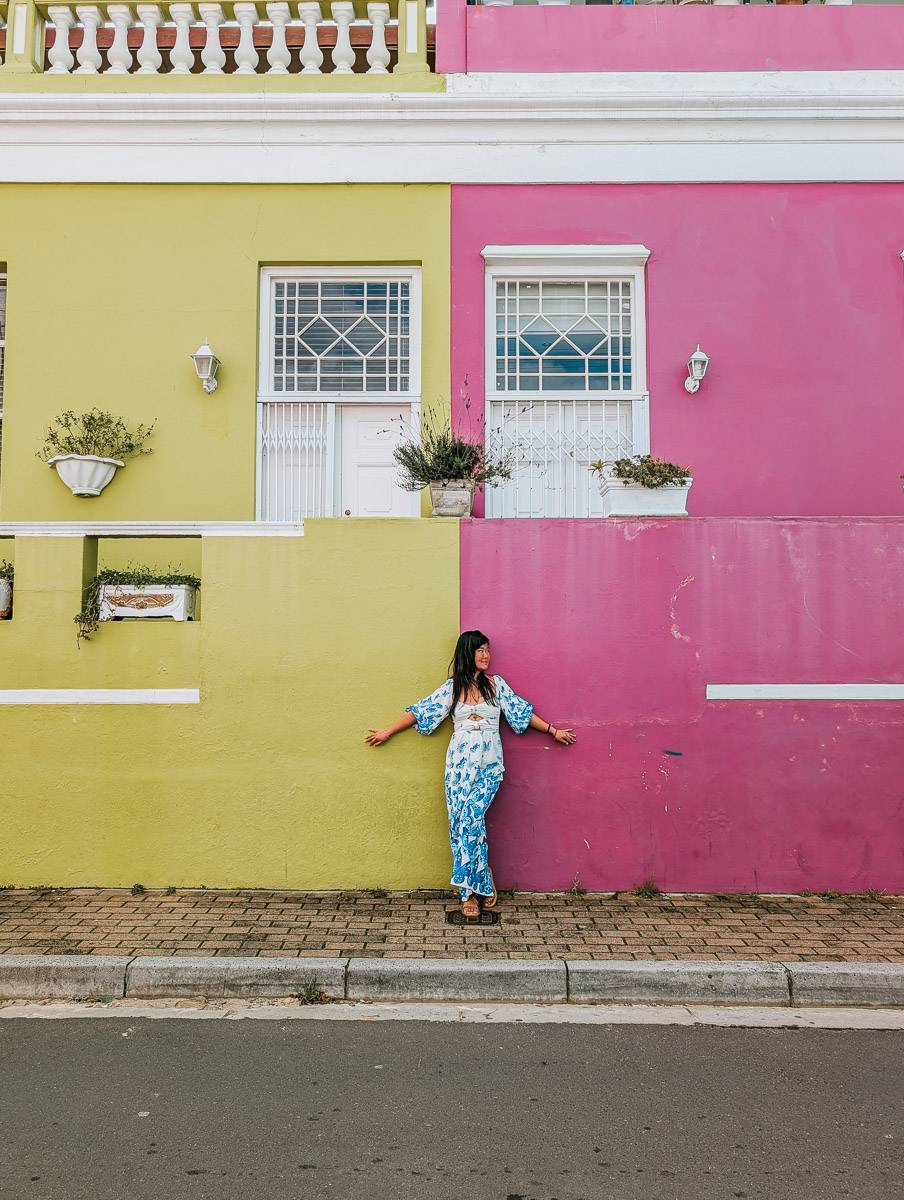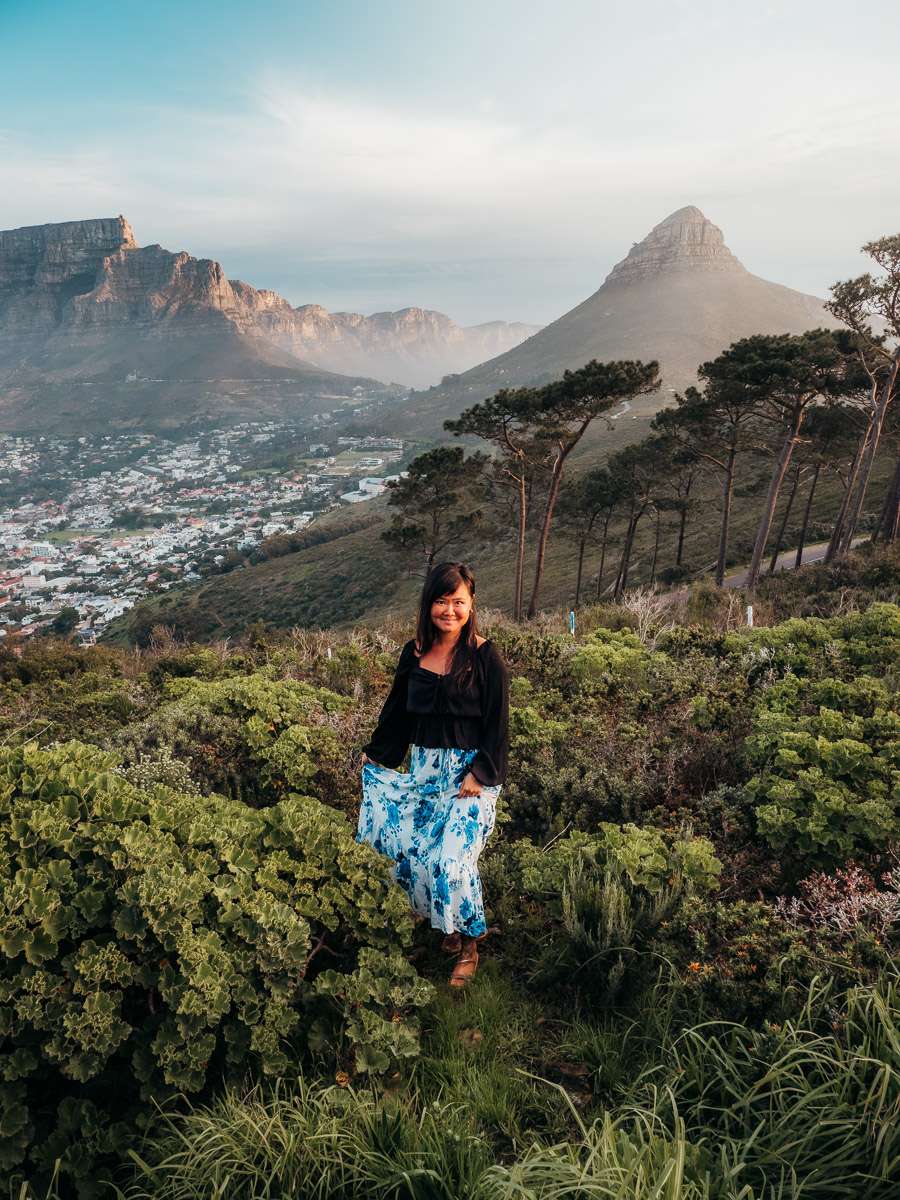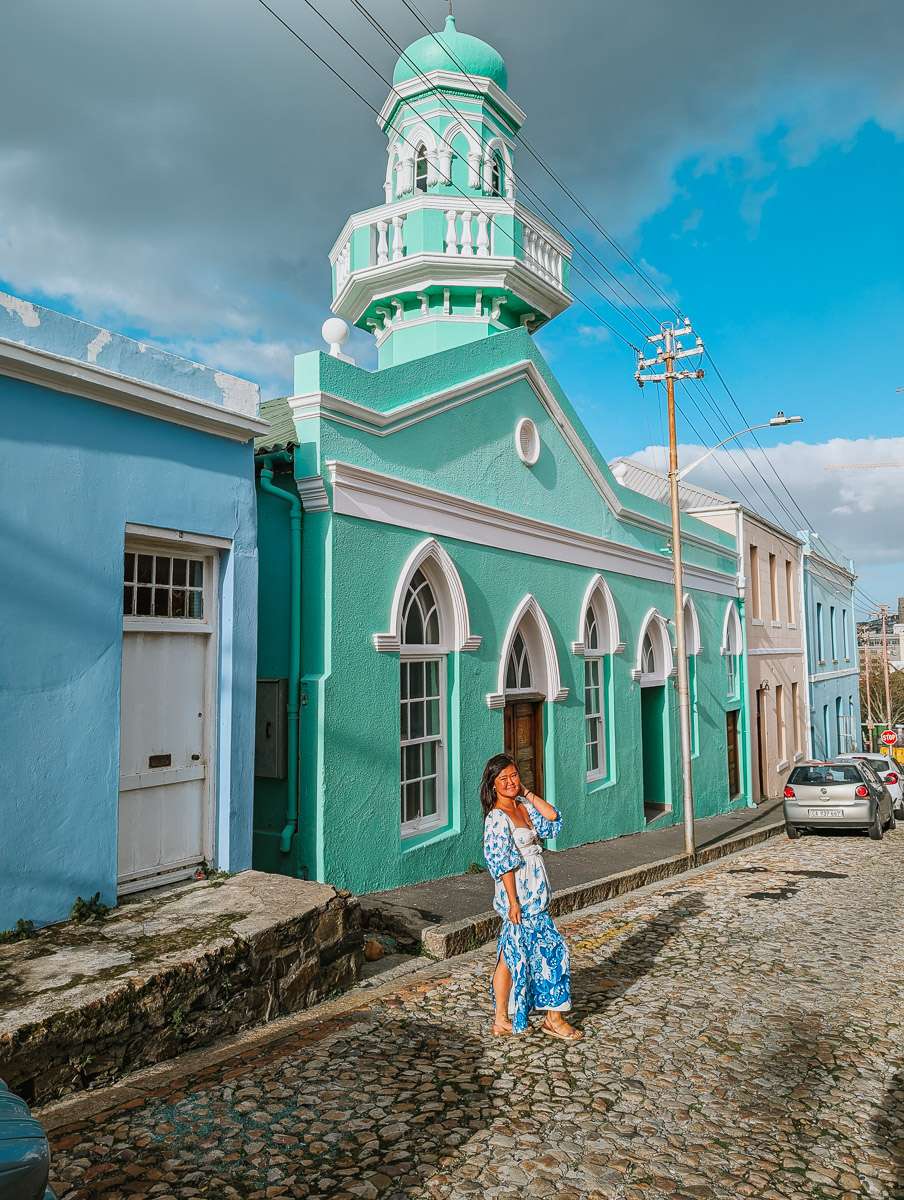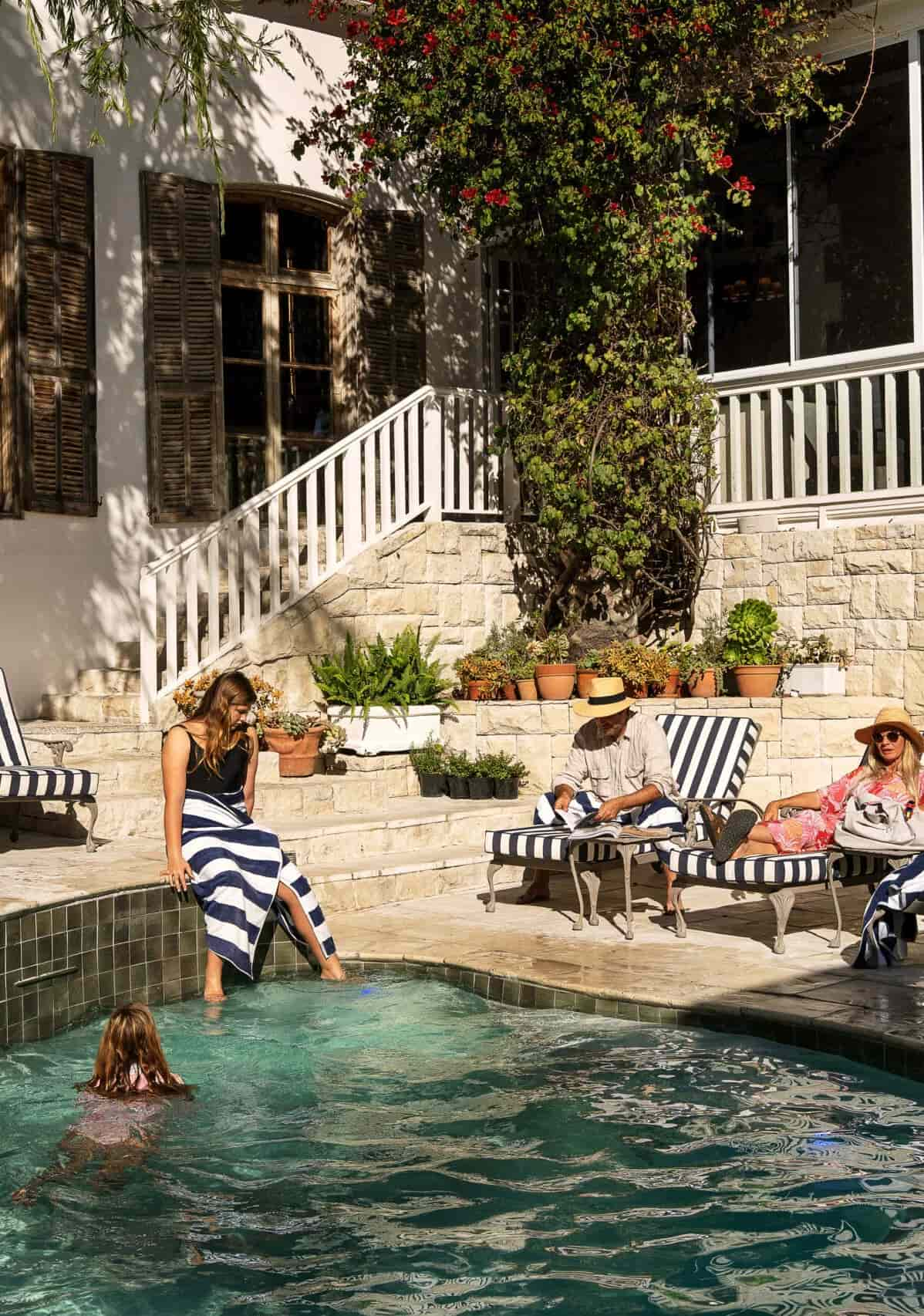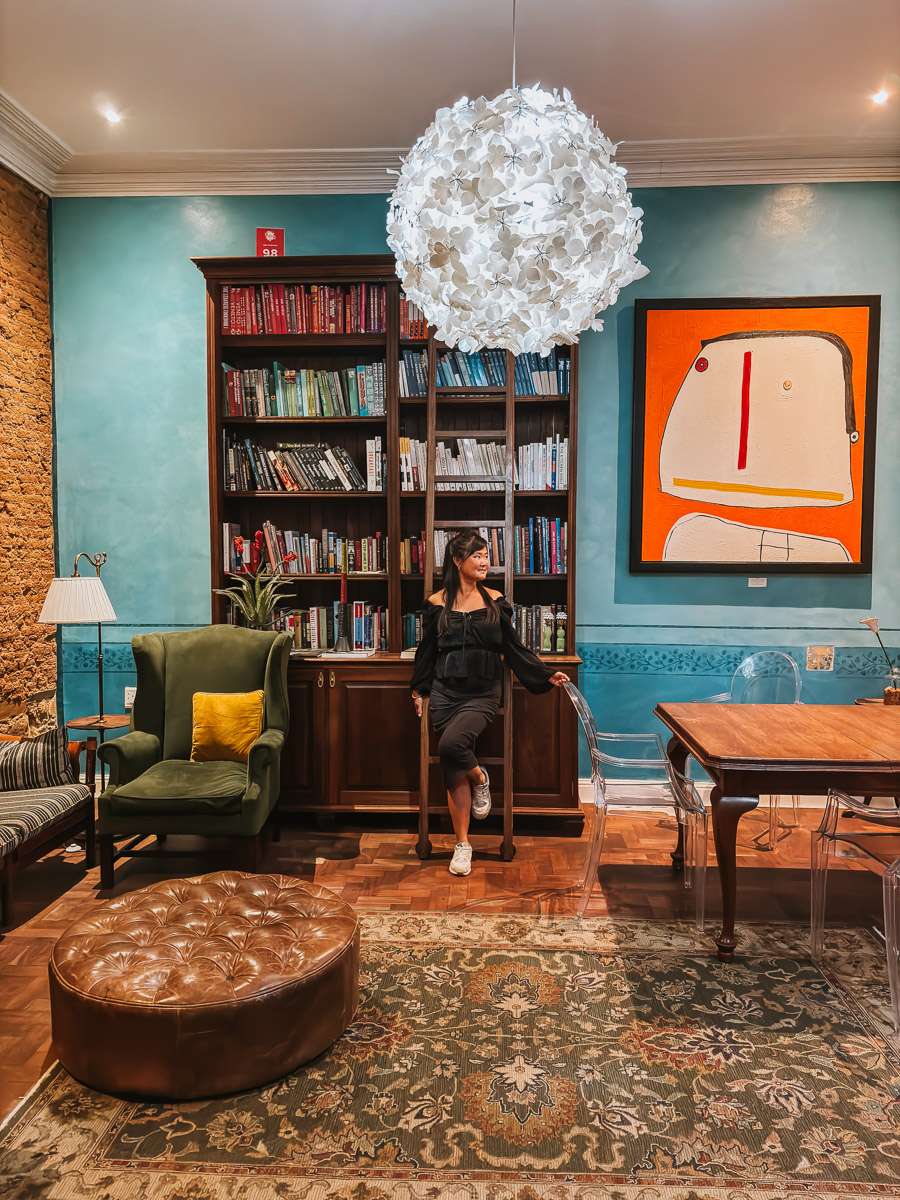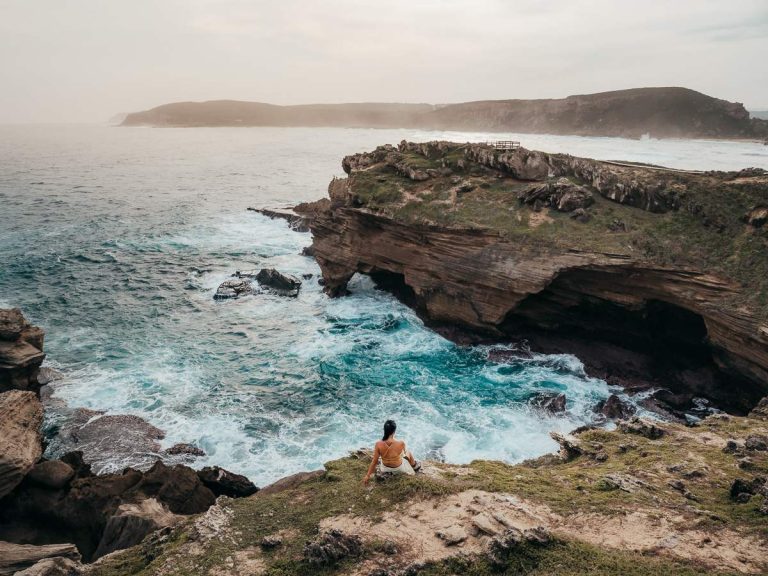Is Cape Town Safe for Tourists? 8 Must-Know Safety Tips Before Visiting

Cape Town is an absolutely stunning and vibrant city and one of the hottest spots to visit in South Africa. But it also has a reputation for being one of the most dangerous cities in the world, with crime rates that can sound alarming. With that said, statistics don’t always paint the full picture of what it’s actually like to visit as a tourist. So before our trip, we did a ton of research about Cape Town’s safety, and most blogs said the same thing: yes, the crime rate is high, but they felt completely fine by taking basic precautions. The problem? Hardly anyone really explained what those precautions actually were. Which specific activities are safe or unsafe to do? Which areas should you avoid? What should you be careful of? Because safety in Cape Town isn’t as simple as a yes or no, we’ve broken it down into different categories, along with our personal experiences and honest recommendations for each.
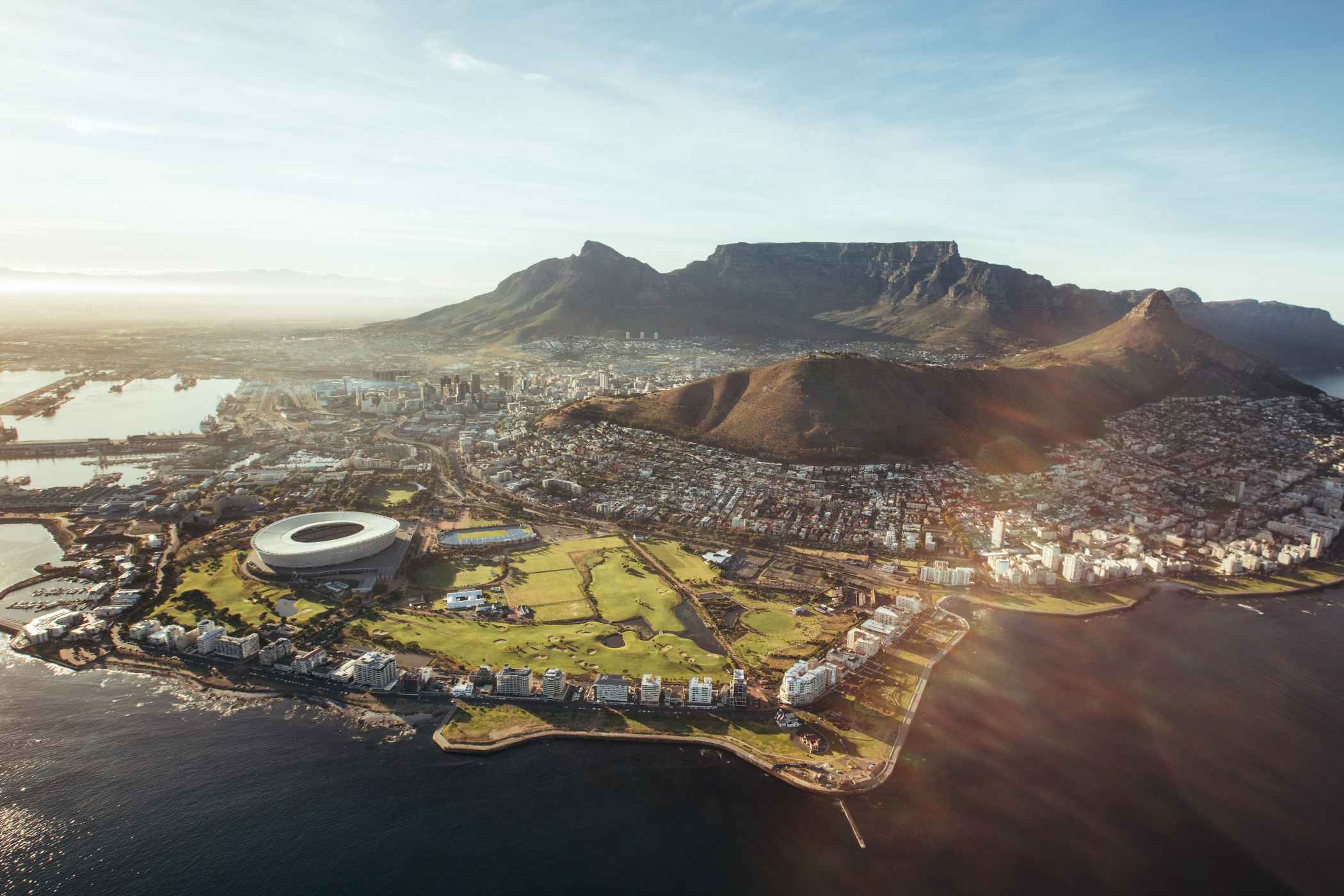
General Safety in Cape Town
Cape town often makes it onto lists of the world’s most dangerous cities. Yes, the crime rate is quite high, but most incidents happen in the townships and areas far from the city centre.
Overall, the main tourist areas are relatively safe, especially during the day. Just stick to busy streets, keep your valuables out of sight (avoid wearing jewelry or flashy watches, and try to keep bags or purses minimal and close to your body at all times), and once the sun goes down, grab an Uber instead of walking.
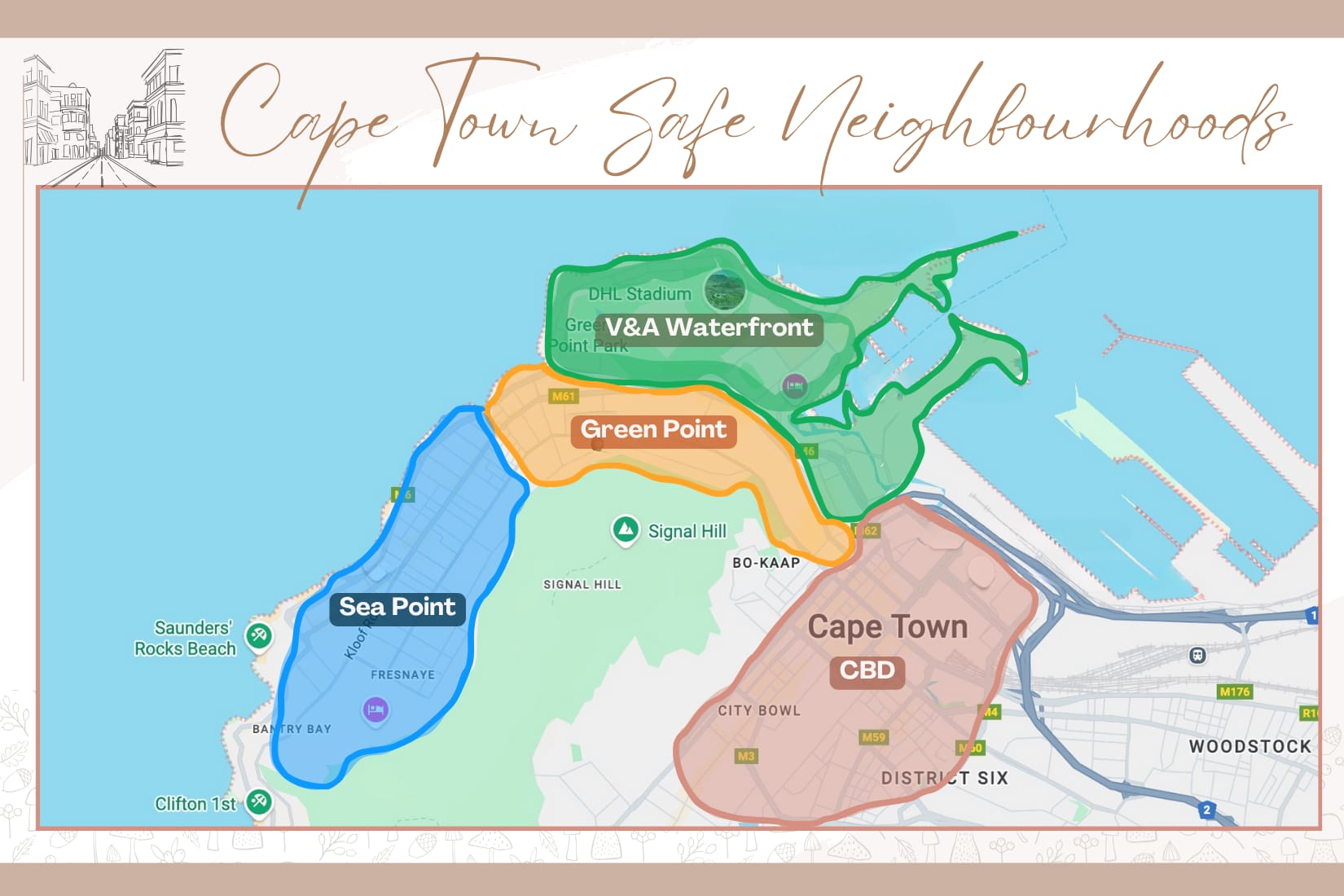
During our Cape Town Itinerary, we spent most of our time around Sea Point, Green Point, V&A Waterfront, the CBD (Central Business District), and Bo-Kaap, and felt safe walking around during daytime with normal precautions. The most unworried we felt was while visiting the V&A Waterfront, which is an upscale mall and harbour area with some great shopping.
But at night, the atmosphere of the Cape Town neighbourhoods can change completely. For example, Sea Point, where we stayed, was lovely during the day. Full of bakeries, cafes, and people walking their dogs along the promenade. But at night, there are more homeless people and some sketchy-looking activity, so we made sure to take an Uber when going out for dinner.
Bo-Kaap is another example. It’s quite safe and lively during the day, filled with tourists and walking tours, but locals strongly advise avoiding it after dark.
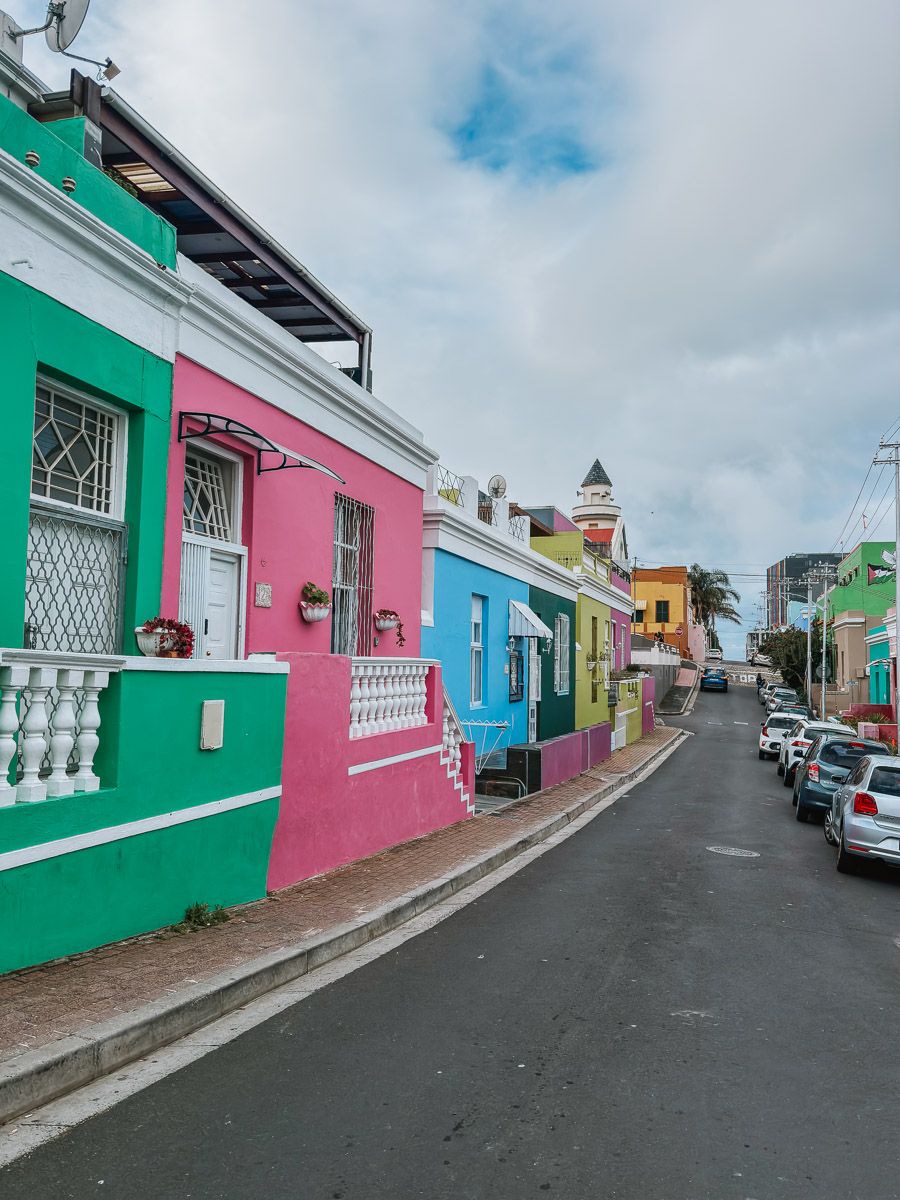
Up next, we’ll break down everything you need to know about safety in Cape Town: from which areas feel safe to walk in, which activities are unsafe to do, to what driving’s really like, and our must-know safety tips.
Crime in Cape Town: Townships
Cape Town is a city of striking contrasts. One moment you’re driving along scenic Chapman’s Peak lined with luxury homes, and the next, you’re passing by run-down shacks in a township. For those who don’t know, townships are areas that were originally created during the apartheid to segregate communities and they still face huge challenges of poverty, unemployment, and high crime rates.
Townships are often densely packed with informal homes made of metal sheets, wood, and plastic, most lacking even basic infrastructure like toilets. While some are safer than others, it’s generally best to avoid entering or driving through them unless you’re joining an organized tour (even then, I generally would not recommend it).
Crime does still happen in the city centre of Cape Town, but the frequency and severity of it are significantly lower than in the townships. To give you an idea, in the townships of Mitchell’s Plain only a 30 minutes drive from Cape town CBD, there were 1,624 violent crime incidents reported in just the first 3 months of 2025.
In contrast, tourist-centric areas like Cape Town Central and Seapoint report dramatically lower numbers, often fewer than 100 incidents per quarter. These also tend to be opportunistic crimes such as pickpocket, break-ins, and minor assaults, rather than the extreme violent crimes of townships that include homicide.

For this reason, we recommend avoiding the townships entirely and staying within the main tourist areas of Cape Town. If ever you’re interested in learning about their history and culture in Townships, the only safe way to do so is by joining an organized guided tour like this one.
🎁 Planning a trip to Cape Town? ➡️ Check out our Full Cape Town Itinerary Guide where we share our favourite spots, hidden gems, where to stay, and more!
Are Attractions like Table Mountain safe
We’re avid hikers, so naturally, any chance to trek up to a viewpoint for sunset has us interested. But what really surprised us was how unsafe a famous attraction like Table Mountain and Lion’s Head can actually be.
Safety on Table Mountain
Many hiking routes around Cape Town are not recommended unless you’re in a group of four or more. We were shocked to hear that in just the first five months of 2025, there were 47 reported attacks on the trails of Table Top Mountain alone! If this trend continues, 2025 could surpass the previous record of 151 attacks in 2023.

The locals consistently advised us to either join a guided hike or simply take the chairlift directly up and down. We wanted to mention this because most travel blogs highlight how incredible the view is from the top of Table Mountain, but rarely talk about the real risks involved.
- We decided to enjoy the view from Signal Hill: Safe and free!
- View of Table Mountain
Safety on Lion’s Head Trail
We also received similar warnings about hiking another popular trail, Lion’s Head for sunset. While the views are apparently incredible, parts of the trail pass through quiet, low-traffic areas, making it a potential target for crime.
Plus, if you go for sunset, you’ll likely be descending in the dark, which adds another big layer of risk. So if you’re interested in experiencing hiking on Lion’s head, we would strongly suggest going on a guided Lion’s head hiking tour like this one.
Safe & Free Alternative: Signal hill
During our time in Cape Town, we decided to skip the hike up Lion’s Head and Table Mountain and opted for a safer alternative, Signal Hill. You can drive all the way to the top, park easily, and enjoy a breathtaking sunset with Table Mountain as the backdrop, all while surrounded by other visitors in a safe atmosphere. We also noticed there were patrols and guards for added security.
Bonus: you can also paraglide off Signal Hill if you want a dose of adventure!

We’ve heard that the government has begun gradually increasing patrols and security along the hiking routes, but so far, the impact on overall safety remains to be seen. If you’re interesting in seeing up to date information and news about Table Mountain, you can check out the Friends of Table Mountain Facebook Page. We used it during out stay to inquire about the latest recommendations and if it was safe to visit.
Is Walking in Cape Town Safe
Walking around Cape Town is generally safe as long as you stick to the main tourist and high traffic areas like the CBD, Sea Point, Green Point, and the V&A Waterfront.
While walking on the streets, you may be approached by homeless people. Cape Town had a surprising amount of homelessness, and it’s best to keep moving and politely decline rather than stopping to engage, as lingering can make you vulnerable to pickpocketing or distraction tactics.
Finally, once the sun sets, it is best to take an Uber or drive rather than walk.

For example, one evening we went for dinner at Tomson Restaurant on the lively Bree Street. Afterward, we decided to walk just three blocks to a convenience store near the edge of Bo-Kaap, and the atmosphere was completely different. The streets were quiet, with a noticeably different crowd, and it felt significantly less safe. Luckily, it was a quick errand and we had already asked our waitress if it was okay to walk there, but in hindsight, we would’ve just taken an Uber.
So as a rule of thumb, it is okay to walk during the day in the main tourist areas with high pedestrian traffic. But once it is night time (once the sun sets), then we recommend always taking an Uber.
🦁 Want to discover more of Africa? Some of our most unforgettable experiences include driving the Panorama Route, staying at private game lodges in Kruger, and embarking on a self-drive camping adventure through Namibia. From awe-inspiring sand dunes in Sossusvlei, kayaking with seals in Swakopmund, to chasing the Big 5 at Etosha, Namibia is one of our favourite destinations EVER.
Is Driving in Cape Town Safe
Coming from Johannesburg, where we’d heard plenty of carjacking stories, one of our biggest worries was whether driving in Cape Town was safe. After experiencing it firsthand, we’d say that driving in Cape Town is generally safe, as long as you stay within the central areas and avoid routes passing through or near townships.
The first rule is to avoid Townships. On our way back to the airport, we even saw a road sign nearby the township with the warning: “Extreme high crime zone. Do not stop here for any reason.” So yes, those warnings are real.
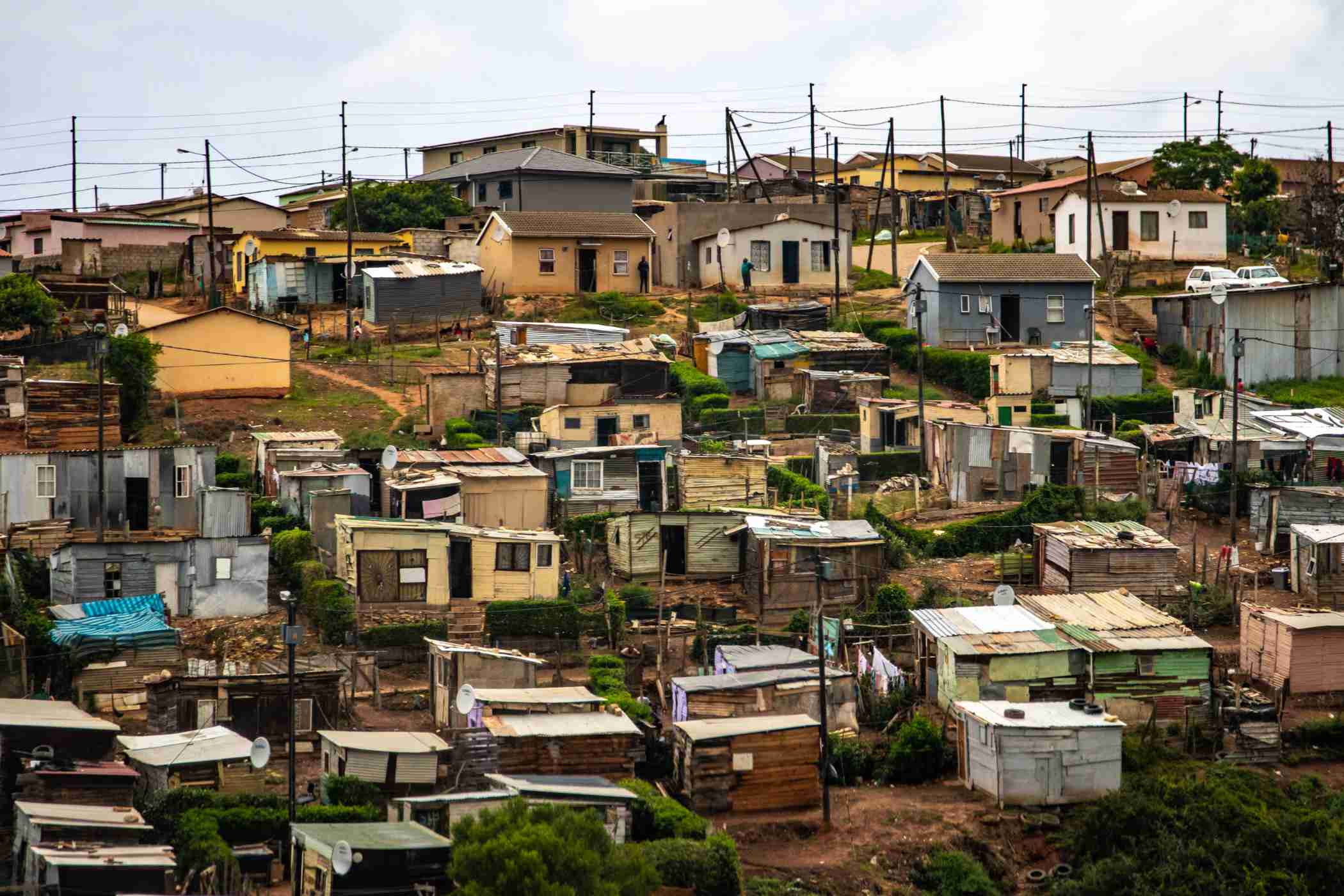
During our 2 week stay in Cape Town, we ended up renting a car and go to drive all around Cape town and some day trips outside the city. We went to an amazing sunset spot at Signal Hill and The Rock, drove through the CBD, and even day trips to Franschhoek and Boulders Beach, and always felt fine.
We just made sure to keep the windows up, doors locked, and alert for anyone approaching our car at stops. These are the same precautions we took while driving the Panorama Route to Kruger National Park and our trip also went without a hitch.
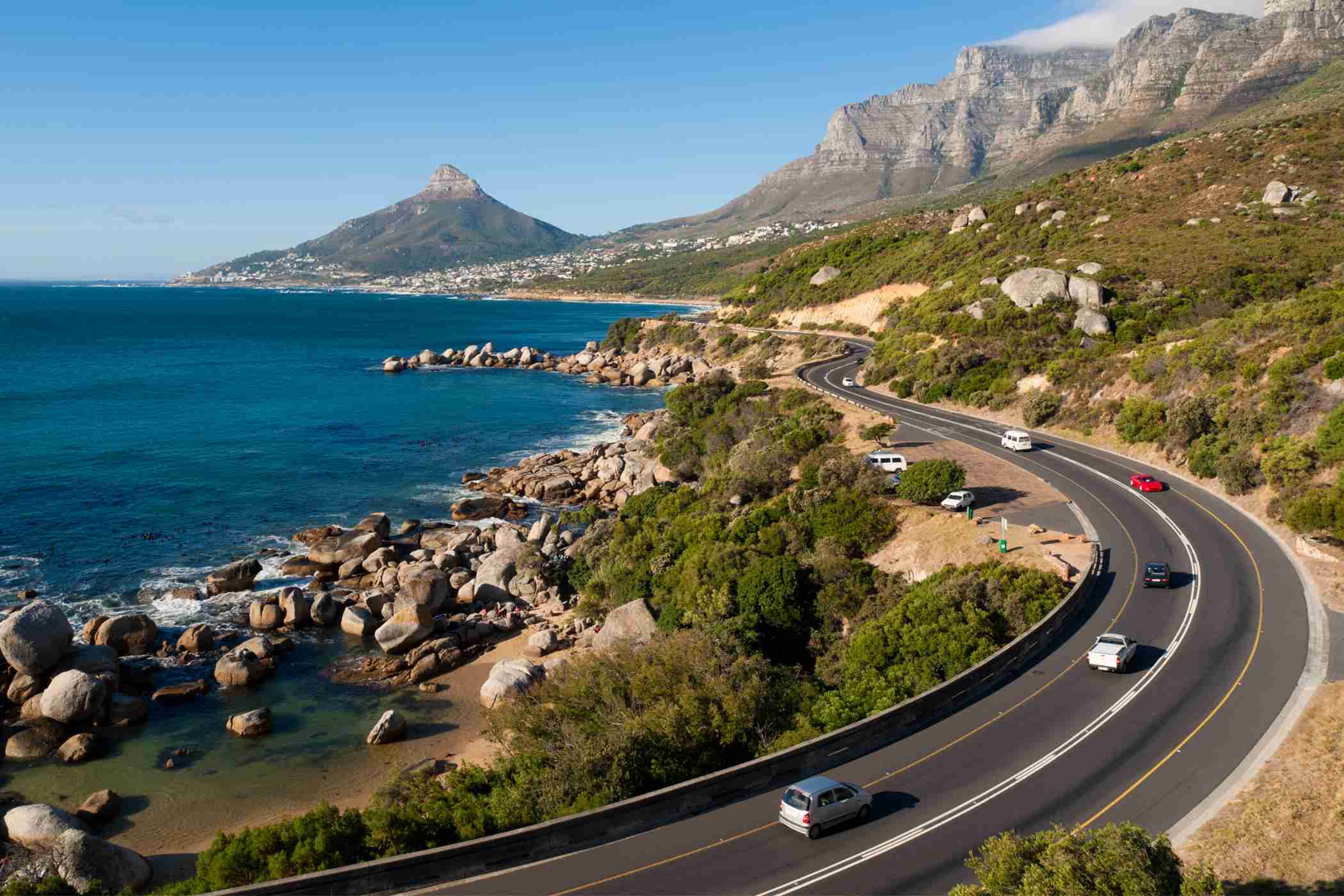
Driving at night in the main areas also felt okay, but the bigger concern was parking and walking to our destination afterward. If a place didn’t have private parking, we usually just took an Uber instead, which felt safer and easier.
Personal Example of Safety at night
To give you a personal example: we stayed in the safe neighbourhood of Sea Point, and one evening we planned to have dinner along the main street. After driving around, we couldn’t find any parking on the main road, but only spots on the quiet, dimly lit side streets.
Instead of taking the risk, we drove back to our accommodation where we had secure parking and ordered an Uber to the restaurant. It just wasn’t worth risking our car’s and our own safety to park and walk on those dimly lit streets.
Is Uber Safe in Cape Town
We used Uber several times during our stay in Cape Town and found it to be a safe and reliable way to get around. The locals we spoke with also recommended sticking with Uber over Bolt or local taxis and public transportation.
By using Uber, there is an extra layer of safety, with verified drivers, real-time trip sharing, and PIN verification to ensure you’re getting into the right car. But for an even greater peace of mind, you can also opt for one of Uber’s higher-tier ride options, which tend to have more experienced drivers and better-rated vehicles.
We had used Bolt several times in Johannesburg and had overall positive experiences, but we decided to listen to the locals’ recommendations and stuck with Uber during our stay in Cape Town.
If ever you don’t want to worry about transport and how to get to your accommodation after landing in Cape Town Airport, I always recommend arranging your transport through WelcomePickups. We’ve used their service several times with always positive experience and it’s our go-to whenever we stumble off a long flight and just want someone waiting with our name on a sign.
This post is part of our series about South Africa. If you want to learn more about South Africa, planning your trip, and some of the best experiences there, check out the guides below:
8 Essential Tips for Staying Safe in Cape Town
Below are 8 essential safety tips for visiting Cape Town. These are the same precautions we follow in countries with higher crime rates, like many South American destinations. They’re valuable habits to develop for travel anywhere in the world.
1) Stick to the safe areas and neighbourhoods
Base yourself in well-patrolled, tourist-friendly neighbourhoods like Sea Point, Green Point, or the V&A Waterfront. These areas are lively areas and very walkable during the day. Many accommodations here also tend to have private and secure parking which is important if you have a rental car. The CBD is generally safe during the day, but at night it’s best to stay within the few well-lit, busier streets where there are plenty of people around.

2) Avoid walking after dark, and stick to busy areas
This is probably the #1 rule locals repeat. Once the sun sets, do not walk on the streets and switch to Uber to get around, even if your destination looks close on the map. We had to take the same precautions while visiting Johannesburg, where locals advised taking an Uber even if you only need to walk 2-3 blocks.
3) Use Uber (Not Bolt or local taxis)
Uber is generally considered the safest transport option in Cape Town, thanks to driver verification, GPS tracking, and PIN verification features. Avoid random taxis or unofficial rides. Although we’ve used Bolt several times in Johannesburg, the locals said Uber is far more reliable and safe in Cape Town.
4) Don’t wear or show valuables, including your cellphone
Keep jewelry, expensive watches, and designer bags at home. Locals also recommend to not pull out your phone while on the streets. Having travelled through many dangerous cities in South America, we got into the habit of never looking at our cellphones while walking. And if we needed navigation, we would step into a store to check our phone, rather than stopping on the street.
5) Keep your car doors locked and windows all the way up
When driving, lock the doors, keep windows rolled up, and avoid stopping at deserted or poorly lit spots, especially near townships or at “high crime zone” signs. Carjackings most often occur when vehicles are stopped at red lights, so always stay alert and keep an eye out for anyone approaching your car.
6) Park in secured areas
Always park in secured lots or monitored areas. Avoid leaving anything visible in the car, even small bags or chargers can attract break-ins. We made sure that our accommodation had private and secure parking, and whenever we went out, we would seek out secured parking lots rather than street parking.
Quick Tip: If you need secure parking while visiting the CBD area, this was our preferred parking lot!
7) Hike only in groups of 4 or more (or join a guided group tour)
Unfortunately, several of Cape Town’s most famous hiking trails are not considered safe, including the well-marked routes up Table Mountain and Lion’s Head. Locals we spoke with strongly advised against hiking these trails alone and recommended only doing them as part of a large guided group.
In contrast, we did do some independent hikes while visiting Franschhoek (1 hour outside of Cape Town) and it was completely safe. So this hiking safety restriction mainly applies to hikes within Cape Town.

8) Do not visit Townships independently
Never attempt to visit or explore the townships on your own. This is where most of the crime happens in Cape town. If you want to experience the cultural side of the townships, do it with a guided tour like this one. Professional guides know where it’s safe and can share powerful insight into the area’s history.
We had done a walking tour in Johannesburg that included the Township of Soweto and found the experience really enriching, but we would’ve never attempted to do it on our own.
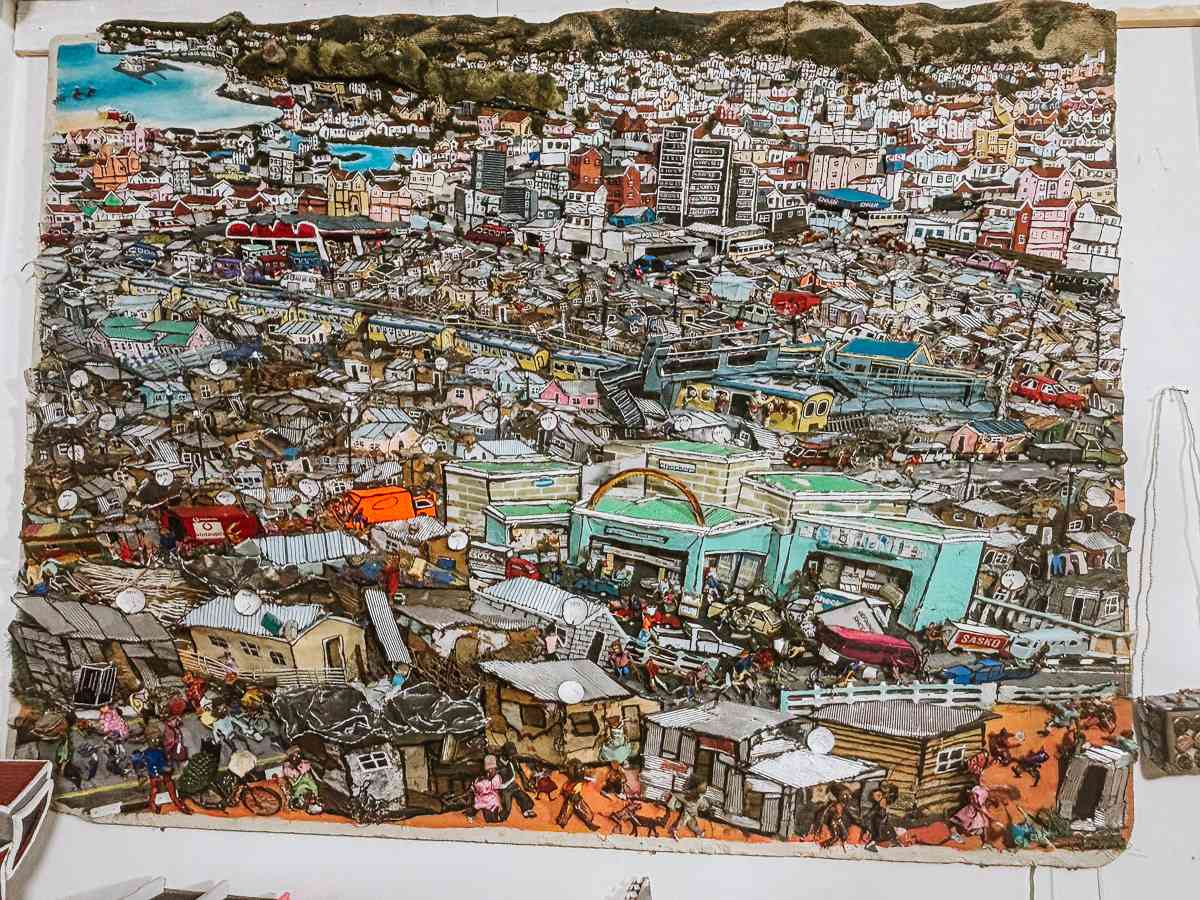
Safe Neighbourhoods in Cape Town
As you can probably tell by now, safety in Cape Town isn’t as simple as a clear yes or no. Even the “safe” neighbourhoods require the same level of awareness and security precautions. With that said, it’s still useful to know which areas are generally considered safer both for planning your activities and deciding where to stay.
We had done a ton of research before deciding on where to stay in Cape Town. We wanted a neighbourhood that:
- Felt safe
- Was close enough to major attractions
- Offered private and secure parking
- and ideally had visible street patrols.
With those criteria in mind, we narrowed our search down to four main areas: Sea Point, Green Point, V&A Waterfront, and the northern end of the CBD.

To help you pick where to stay in Cape Town, we’ll share below our own curated list of hotels that we personally considered for our trip.
where to Stay in Cape Town
We’ve narrowed it down to 4 neighbourhoods that are safe, central, accessible, and includes secured parking. Each have their own advantages so we have highlighted the main benefit of each neighbourhood, as well as some standout features of each hotel choice.
V&A Waterfront: Upscale + very safe
- AC Hotel Waterfront (beautiful luxury hotel, fitness center, secure parking, buffet breakfast)
- Dolphin Inn Guesthouse (beachfront, private parking, Bed and breakfast, located on a quieter area)
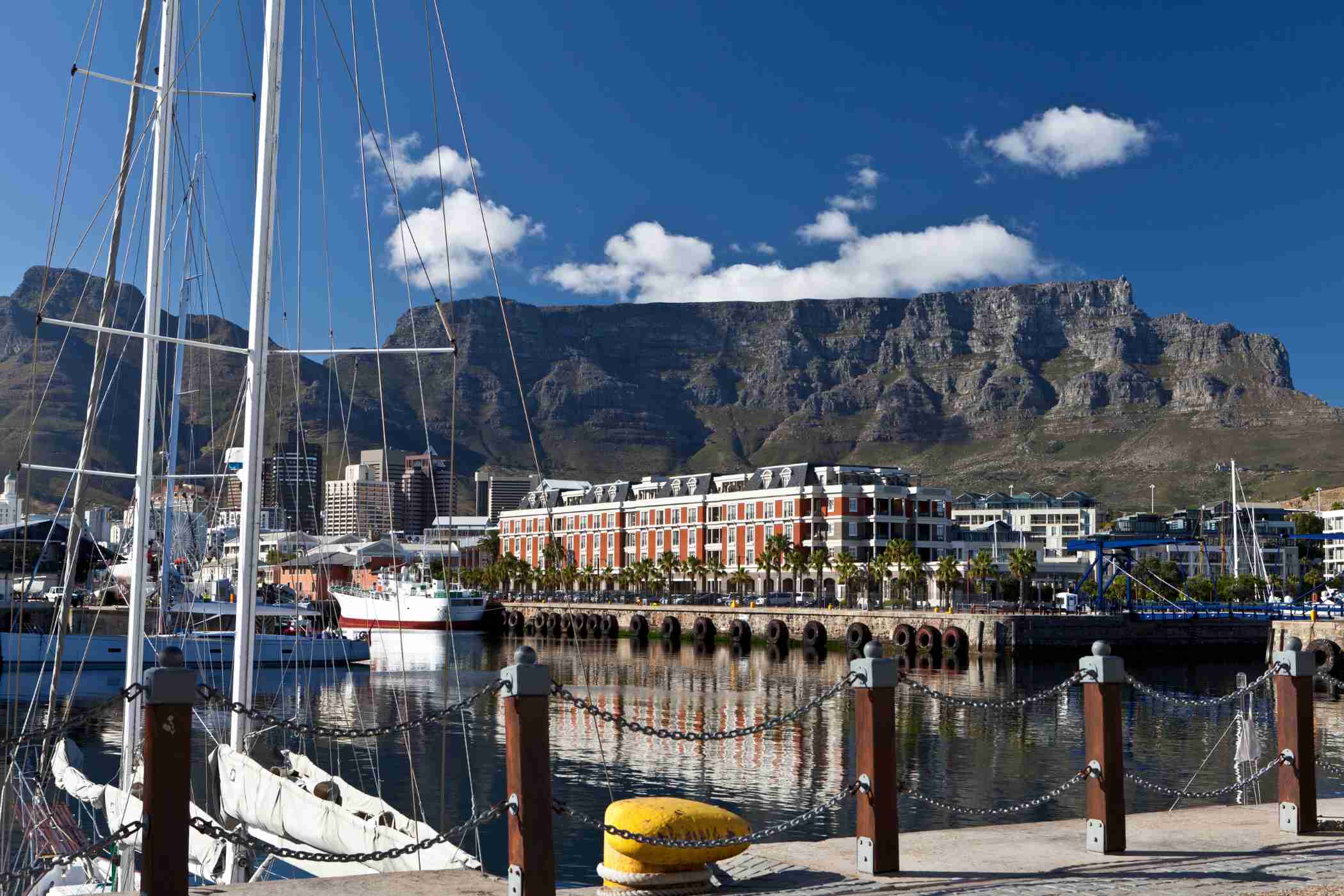
Sea Point: More local + close to the beach
- The Glen Boutique Hotel & Spa (Luxurious rooms, outdoor pool and spa facilities, breakfast buffet, a la carte dinner poolside, massage treatments)
- Loloho Lodge (Adults only, 4 star B&B, lush garden, outdoor swimming pool, 8 mins walk to Rocklands Beach)
Green Point: Close to Downtown + Next to Lion’s Head
- DysArt Boutique Hotel (No loadshedding, boutique hotel, just minutes from V&A, free parking, swimming pool)
- Blackheath Lodge by The Oyster Collection (Victorian Boutique Hotel, just below Signal Hill, Breakfast on terrace, Pool and Garden, quiet retreat)
- Photo Credit: Blackheath Lodge
- Photo Credit: Blackheath Lodge
- Photo Credit: Blackheath Lodge
- Photo Credit: Blackheath Lodge
Northern CBD: Very Central but less safe than the other options
- The Rockefeller Hotel by Newmark (Room with balcony, rooftop and indoor swimming pool, directly in CBD, very modern)
- Cape Heritage Hotel (located in elegant Heritage Square, roof-top jacuzzi, central location very close to famous restaurants, paid parking across the street)
Using WISE card in South Africa
When taking cash out of an ATM while abroad, you will most likely be charged both a foreign exchange fee and a foreign transaction fee by that country’s ATM. With my Canadian card, this can easily be 3-4$ + 2.75% + a markup on the exchange rate charged by my bank, and then another 3-5$ charged by the foreign ATM.

This can be really costly. For this reason, we recommend using WISE card which has only minimal fees and just about no foreign currency exchange markup. This helps me save at least 5-7$ every time I take out money from an ATM. If you want to see our full review of the card showing exactly how WISE can help you save, check out our WISE Travel card Review post.
Summary: Is Cape Town Safe to Visit
Cape Town might have a reputation for danger, but that shouldn’t stop you from experiencing it. Millions of travelers visit this stunning city every year, and with the right precautions, your trip can be just as stress-free and incident-free as ours was.
We spent over two weeks exploring Cape Town and the nearby wine region of Franschhoek, and by following the 8 essential safety tips we shared above, we were able to enjoy every moment without feeling unsafe.
We also drove the breathtaking Garden Route and witnessed some of South Africa’s most spectacular landscapes, and once again, we felt completely fine. Hopefully, this guide has helped you get a clearer idea of what safety in Cape Town really looks like, and more importantly, how to stay safe while enjoying every bit of your trip.
Looking for more travel inspiration?
Incredible volcanoes and ancient Mayan civilizations: Tikal and Antigua in Guatemala.
Hiking in the Andes and discovering Machu Picchu: Travel itinerary in Peru, hiking to Machu Picchu
Exploring ancient cave dwellings and riding hot air balloons in Cappadocia
Exploring and sailing on the Turkish Coast
Hiking in one of the US’s best national parks and road tripping through Utah
Discover Vietnam and the exciting northern Ha Giang Loop, as well as the Unesco city of Hoi An.





